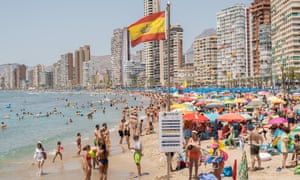What does the falling pound mean for holidays and prices?
Fears of a no-deal Brexit have sent the pound plunging this week, with currency markets more alarmed than at any time since the immediate aftermath of the EU referendum.
When the foreign secretary, Dominic Raab, told BBC Radio 4 on Monday morning that “We must be prepared to give the country the finality it needs, to prepare businesses and people more broadly”, currency traders immediately began marking down the pound.
On Monday it dropped 1.3% against the US dollar to touch $1.22, while against the euro it fell below €1.10. Relentless selling pressure continued on Tuesday, with sterling falling by a further 0.4% in early trading, taking it below $1.22.
“It appears we are finally seeing the potential repercussions of the UK leaving without a deal,” said currency traders Clear Treasury.
What does this mean for you? The immediate impact is on holidaymakers heading to Spain and other destinations in the EU, but a collapse in the currency also has much wider implications for household finances.
How much will I get for my money on holiday?
It’s grim, with rates on offer far worse than the “market”’ rates that traders talk about. At some UK airports, the pound is already worth less than a euro, and the same as a dollar.
For example, at Heathrow, customers walking up to Travelex desks on Tuesday morning were being given just €0.91 for each £1, while if they wanted dollars the rate had collapsed to just $1.01.
But sensible travellers know to buy their currency in advance online, avoiding the airport bureaux. Travelex is currently giving online customers €1.063 and $1.184 respectively for each £1.
Should I change my money now or wait for sterling to recover?
A tough one. Sterling is having its worst month since October 2016 as it has lost 4.3% so far since the beginning of the month. But it could get a whole lot worse. “The pound is beginning to look scarily cheap, with investors positioning themselves for a rocky few months before the next Brexit deadline,” said Fiona Cincotta, a senior market analyst at Cityindex.co.uk. With the political rhetoric as it is, a rebound in sterling much before the 31 October exit deadline now looks unlikely.
How far could sterling fall?
Parity with the euro no longer looks unlikely, and history tells us once the currency trapdoor opens, the falls can be painful; sterling sank to near parity with the dollar in the mid-1980s, although only for a brief period.
What other effects does a fall in sterling have on my finances?
Prices of imported goods in the shops – and that’s an awful lot of what we consume as a country – will have to rise. You know those price tags on clothes in Zara, in euros, sterling and other currencies? It won’t be long before they are adjusted again, with the price in sterling inevitably having to rise. There is a lag effect here – so the rise won’t be immediate, but it will flow through eventually.
Will interest rates go up to ‘save the pound’?
That’s a bit old school. Historically, a sterling crisis usually prompted a rise in interest rates to encourage foreign speculators to hold the pound. But we’re now in very different territory, with the US Federal Reserve expected to cut its main rate by 0.25% on Thursday and the European Central Bank possibly following soon after. In this environment, there’s virtually a zero chance of a rate rise by the Bank of England.
Are there any winners?
Yes, tourists are the winners – just not British ones. Anyone visiting London this summer from abroad is finding it to be a top-value shopper’s paradise.
Since you’re here…
… we have a small favour to ask. More people are reading and supporting The Guardian’s independent, investigative journalism than ever before. And unlike many news organisations, we have chosen an approach that allows us to keep our journalism accessible to all, regardless of where they live or what they can afford. But we need your ongoing support to keep working as we do.
The Guardian will engage with the most critical issues of our time – from the escalating climate catastrophe to widespread inequality to the influence of big tech on our lives. At a time when factual information is a necessity, we believe that each of us, around the world, deserves access to accurate reporting with integrity at its heart.
Our editorial independence means we set our own agenda and voice our own opinions. Guardian journalism is free from commercial and political bias and not influenced by billionaire owners or shareholders. This means we can give a voice to those less heard, explore where others turn away, and rigorously challenge those in power.
We need your support to keep delivering quality journalism, to maintain our openness and to protect our precious independence. Every reader contribution, big or small, is so valuable. Support The Guardian from as little as $1 – and it only takes a minute. Thank you.



0 Commentaires